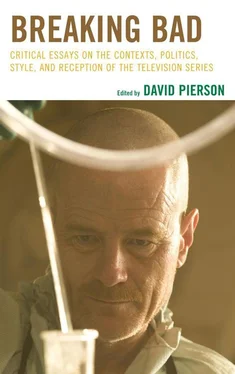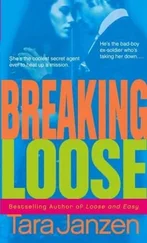The connection between Walt’s more aggressive sexual appetite, the possibility of his death, and his new criminal outlook is highlighted on several occasions after he steals equipment from the school where he works and coerces his former student, Jesse Pinkman (Aaron Paul), into making crystal meth with him. Walt uses his cancer diagnosis as an opportunity to take charge of his life and his fortune after seeing all the money that Hank seized in the raid. Walt bullies Jesse by criticizing his meth cooking skills and the poor quality of his product. Walt, however, soon discovers Jesse, like Hank, judges Walt’s masculinity when he tells Walt, “you can dress up like a faggot, but not me” when Walt shows Jesse the safety goggles and aprons that he has stolen. Later, when Jesse questions Walt’s motives after they agree to their partnership and the purchase of an RV to use as a mobile meth lab, Walt tells him that he has woken up. He has withdrawn his life savings from a bank to pay for the RV. Walt’s statement and actions show that he realizes that men like him who obey the law and try to be model citizens and still struggle often are only able to get ahead in the world by relying on illegal means. When Walt tells Jesse he is awake, what he gives voice to is the realization that for men like him to take control they must embrace a model of hegemonic masculinity and in doing so it allows them to regain their agency.
Yet, what Walt fails to understand is that making the drugs is the simple part. All the other things that go along with it, such as making calculated and immoral decisions, he does not consider until he faces his own anxiety and mortality head on. Jesse introduces him to the dark side of the business and to insane people like Krazy-8 and Emilio who Walt is forced to deal with when they try to kill him and Jesse. It is after his brush with death that Walt begins to change and finds the confidence to be sexually aggressive with his wife. In the episode “A No-Rough-Stuff-Type Deal” (3/9/08) Walt sexually stimulates his wife underneath a table during a meeting with parents, local law enforcement, and school administration officials at the school where he works. As the group is being briefed on the dangers of the drug problem, Walt ignores the meeting and instead focuses on his own desires, desires that he satisfies after the meeting when he and Skyler have sex in his car in the school parking lot. Walt tells Skyler that their sexual encounter was so pleasurable because “it was illegal.” Walt learns over the course of the first season that “illegal” acts can be pleasurable and in turn make him feel more masculine and thus enable him to be awakened from the stupor that crippled his male psyche.
HE’S A GOOD MAN ISN’T HE?: FATHER, HUSBAND, PROVIDER?
The last episode of season two “ABQ” (5/31/09) focuses on Walt’s connection to his family, Jesse, and the business. In the episode Walt attempts to be supportive of his son who has set up a web site to help raise money for the family and for Walt’s cancer treatments. However, it is Walt’s masculine pride that continually damages his relationship with his wife and family. When Saul Goodman suggests using Walt Jr.’s website to launder the drug money, Walt complains that the website is simply another form of begging for money. Walt’s status as husband and provider become critical to the formation of Walt’s newer more aggressive masculinity in the series as he continues to juggle between his secret life of drug dealer and doting father and husband.
Stella Bruzzi (2005) shows the importance of the status of father in defining American masculinity in her book on fatherhood and Hollywood. Bruzzi points out that in America there is perhaps no figure or signifier more important to the formation and function of American masculinity than that of the father. In her analysis of contemporary models of fatherhood, she argues that the traditional domineering model has been transformed into a man who is flawed but who bases his own notion of fatherhood on traditional models that he no longer believes in nor emulates (Bruzzi 2005). Though Bruzzi focuses on the idea of the model of contemporary American masculinity as flawed in films, her conclusions can be seen in contemporary American television series like The Sopranos (1999-2007), Friday Night Lights (2006-2011), and Breaking Bad (2009-2013) as well. The focus on the father and a type of flawed masculinity in crisis comprises much of the contemporary television landscape.
Amanda Marcotte (2011) maintains that flawed masculinities play a critical role in the representations of masculinity on contemporary American television. She asserts that in today’s television landscape most of the series like Breaking Bad feature men who struggle with their masculinity in a world where male authority is in decline and that often many of these men are shown to be deeply flawed individuals because they cling to older, traditional models of masculinity that have been challenged and problematized by shifts in society, and economics. Kimmel (2009) draws a connection between economic shifts and male status as provider and father when he states that, “most American men have simply continued to go about their lives, falling somewhere between eager embrace of women’s equality and resigned acceptance” (15). He further notes that in this economy, “a man who is not a provider…doesn’t feel like much a man at all” (17). It is this questioning of his status and sense of malaise as a man that Walt tries to overcome as he tries to adopt the role of provider and as a result take control of his life.
Walt recognizes that as a drug dealer he is better able to provide for his family than he ever was as a high school chemistry teacher. For example, in the season two episode “Over” (5/10/09), Walt decides to replace the leaky, inefficient old hot water heater with a new system that he pays for with money he earned from providing his product to Gus Fring. Walt does this in an attempt to show his concern for his family. In the process discovers that the hot water heater was leaking damaging the wood underneath it. Walt then sets about to repair it and becomes consumed by ridding the house of rot as he tries to protect his family’s home and chief investment from further damage. For Walt, money is the route to masculine efficacy and allows him to rationalize all the violence he enacts as he continuously reminds himself that he has become involved in the drug trade in order to provide and protect his family.
The issue of money and Walt’s ability to provide are explored when Skyler, while pregnant, returns to work in the episode “Negro y Azul” (4/19/09). What Walt fails to see is that his actions to maintain control of his cancer and the family are the very actions which drive a wedge in his marriage, to the point that Walt chooses to miss the birth of his daughter in order to deliver his product and become a part of Gus Fring’s enterprise. In order to maintain control of his dual lives, Walt is forced to continually lie to Skyler who at the end of season two demands that Walt leave. When he refuses to do so, she stares him down and then drives off with the baby, leaving Walt alone with his money and the house. In short, Walt is able to reclaim his masculine authority but at the expense of his marriage, his children, his character and perhaps his own humanity.
Instead of trying to salvage his marriage and give up the life of deception, danger, and drugs, Walt decides to further entangle himself with Fring, who becomes Walt’s chief adversary and primary employer when he offers Walt the opportunity to make millions of dollars cooking in an industrial lab that Fring has set up. In order to entice Walt, Fring shows Walt the industrial facility that he has built to manufacture Walt’s product and then he tells him in the season three episode, “Mas” (4/18/10) that a man must be a provider to his family to be a true man. Fring plays on Walt’s desire to be seen as a man who can provide for his family. Fring also understands that even though Walt and his wife’s marriage is in jeopardy that there is nothing more important to him than making sure that his kids’ future is better than their present. Yet, when Skyler discovers a large duffel bag of money she begins to piece together the fact that Walt is involved in something that is dangerous and criminal. Skyler consults a lawyer who tells her that Walt’s actions could cost her the family. Skyler tears up as she thinks about the old Walt she knew and that she did not marry a criminal. Skyler tries to extricate herself from Walt, and his business. Yet, when Hank is attacked by killers working for the Mexican cartel and needs medical care, she convinces Walt to pay Hank’s medical bills with monies he earns working for Fring. As a result of his gesture to help the family Skyler agrees to protect Walt as she looks past his criminal behavior. While Skyler does embrace Walt and his business, including helping him launder his money through the car wash they purchase, what she fails to understand is that the Walt she married is no longer the same man. He is now a brutal criminal who expresses his love through smothering intimidation rather than compassion and freedom.
Читать дальше












